|
Issue Date: December 19, 2003 Gifts for the spiritual seekers in your life By PETER FEUERHERD Christmas came early for me when, right after Thanksgiving, the good people at NCR sent me a box full of books on spirituality, a cornucopia for the soul. We live in what might be a golden age for spirituality writing. All you need do to see this is to take a trip to your local chain bookstore, where spirituality books -- having pretty much taken over the “religion” slot, now out of favor -- compete on relatively equal terms with books on other obsessions such as sex, finances and “American Idol.” This assignment couldn’t have come at a better time. Perhaps spirituality books provide a respite particularly during times of transition, a sense that I feel strongly this Christmas, living in a country that seems tired of a future seemingly filled with the prospect of permanent war. Personally, I am living my own transitions. I have charted out a new career, largely due to circumstances, as a full-time freelancer, an exciting venture yet one akin to walking a tightrope without a safety net provided by a regular paycheck from a steady employer. As I write this, my mother is dying, and I found myself frequently contemplating the contents of these books while sitting by her bedside. No other activity that I know of can focus your attention more on matters of the spirit. Dealing with the prospect of change and death means a greater effort to cling to the verities of the spiritual masters. Of course, there are bad spirituality books out there, including bestsellers that conjure up scenarios of Christians being sent off airplanes and out of their cars to the promise of eternal Rapture. But I will deal here only with the good Christian stuff, targeted, if you will, to the gift-buying needs of the literate and spiritual NCR-reading audience this season. Serious soul-searching There is some serious spirituality coming out of the evangelical world, which includes more than loony television preachers asking the Lord’s help in sending certain Supreme Court justices to their eternal rewards.
It’s good to be reminded that Catholics don’t have a monopoly on being disillusioned with a church. Yancey describes growing up in Georgia where he learned at his evangelical church the wonders of the Bible, inspired preaching and hymns that brought him closer to the Almighty every Sunday. Yet it also, in those turbulent days of the ’60s, spread the message that blacks were not welcome and that God had a special place in his heart for racial supremacy. “I came to realize that the church had mixed in lies with truth,” Yancey notes early in his book. Soul Survivor tells the stories of 13 luminaries who brought Yancey out of this parochial vision of Christianity. They include people Yancey has interviewed, including the Catholic psychiatrist and social activist Dr. Robert Coles and Fr. Henry Nouwen, the late spiritual writer, as well as those he has met only through literature or newsreels, such as Martin Luther King Jr. and the Russian authors Tolstoy and Dostoevsky. These are fascinating profiles -- Nouwen’s struggle with his homosexuality and needy personality is particularly intriguing -- yet Yancey’s writing comes most alive in talking about his own spiritual journey navigating between the rigidity in which he was raised and the loosey-goosey approach to doctrine and morality promulgated by some Christians of a more progressive bent. “Sometimes I feel like the most liberal person among conservatives, and sometimes like the most conservative among liberals. How can I fit together my religious past with my spiritual present?” Yancey asks, and this book provides a gateway to an answer. It would be a great present for a seeking young adult in your life.
Jordan, who died in 1969 at the age of 57, is perhaps best known for being a founder of the Habitat for Humanity movement. But that would be to soft-pedal his legacy. His founding of a utopian Christian interracial community in Americus, Ga., was a courageous example of simple Christianity in a world frequently wracked by Klan violence. These writings provide an example of how evangelical preachers such as Jordan take the scriptures seriously. He rewrote the scriptures in a way that spoke to people of his times and still does today. For example, in Jordan’s “Cotton Patch” version of the New Testament, he provides a particularly American view of Paul’s First Letter to the Corinthians, substituting the noose for the traditional Christian cross. A gift of Jordan’s writings would be a subtle hint for a preacher who needs a little more zip in his scriptural interpretations. Unsettling truths There is perhaps no more strife-filled church arena than mainstream Protestantism these days. Yet through that discord, and perhaps because of it, spiritual gems can still be discovered there.
Williams’ restrained and thorough look at the Gospels can’t help but bring to mind his tenuous current grip on the Anglican communion, which is particularly wracked by arguments over homosexuality and other doctrinal/cultural issues. One of the few personal moments in this piece of writing is his description of the intense spiritual value in the patience that can be learned in dealing with a child who refuses to go to sleep. Perhaps that is good training for an archbishop. Books on spirituality tend to be full of bromides, and Williams has some of his own here. One of his biggest issues is the need to live in the present. He relates that to the bitter intra-church debates which he sees pitting those who look back on a golden age of discipline and order versus those who see a new dawn coming of freedom. The problem, he says, is that few of us are living in the gritty reality of the present. The book was first published three years ago, and I’m sure that the archbishop now has plenty of time to reflect upon the implications of his words for church leadership. All in all, Christ on Trial is a good read but may be jumping the gun on this Christmas season. It is really a Lenten exercise book, complete with discussion questions at the end of each chapter. It could be a good gift for members of your Bible study/small Christian community seeking spiritual sustenance this Lenten season.
What I had was a copy of an uncorrected proof for review, so perhaps a defect in the book will be remedied in the final version. The sermons collected here need more context, but even without that one comes away marveling at the ability of Gomes to take a single line of scripture and draw out its wide implications for our new century. In the introduction, Gomes writes, “Strength for the journey of life is what preaching is about.” What the reader comes away with is that Gomes is preaching to the Harvard community, a unique place. He doesn’t mince words. That community, he notes, is wealthy and gifted, and with that it has responsibilities to a wider world that doesn’t share its bounty. It is also a place, although founded by Puritan visionaries, that has substituted the worship of knowledge and intellectual stardom for God. These are harsh words, but Gomes also illustrates his love and fascination with the Harvard community, a place he has been affiliated with for 33 years. This collection indicates that although it may be awash in secularity, preacher Gomes is delivering a substantial Christian vision to the Harvard community. They are lucky to have him. If you have a college student on your list, Gomes’ words would not be a bad present. Catholic leadership One of the great gifts of the Catholic tradition is the communion of saints. It has been a long-time fascination of Robert Ellsberg, editor at Orbis Books and Catholic convert who made the leap to Rome not on the basis of intellectual arguments but on the examples of some of the church’s greats, including Dorothy Day, whom Ellsberg worked with at the Catholic Worker in the few years before her death.
Ellsberg uses the stories of the saints to provide lessons for our daily lives in a practical, not a smarmy, way. He notes, for example, the increasing technological reliance on “connection” via cell phones and e-mails. Like Archbishop Williams, he focuses on the ideal of living in the present. The sadness of the obsessive cell phone user, he writes, is that it “reflects a terrible desire to be somewhere else, anyplace but in the present moment.” His book is recommended for spiritual pilgrims of all ages and denominations.
Yet Lowney’s book is different. It is a spiritual piece, not only because the company he profiles is the Jesuits. These are stories of how a tiny band of men heroically spread the Gospel to the ends of the earth, through China, Japan, India and the wilds of America. These are stories of great heroism, and while Lowney sometimes strains to make connections between Ignatius Loyola’s crew and modern corporations, the book does have something to say about tapping into the idealism that he says everyone brings to the workplace. Lowney offers a spirituality of work here that needs to be listened to. It would provide a great gift for your boss. Finally, I would be remiss if I didn’t tap into a source who knows probably far more about spiritual reading than I ever did. My mother, Lillian, also the mother of NCR Washington correspondent Joe Feuerherd and four more siblings, spent the past year and a half on an intense spiritual search. As she struggled with cancer, people from her parish would bring her books that filled her bedside table. I recently talked with her about that reading. She warned about the ego issues that spiritual writers have to contend with. Her reading over the past year included such luminaries as Thomas Merton and Henri Nouwen, but she was most attached to Fr. Ronald Rolheiser, the Canadian popular writer.
After that discussion, the last substantive one I had with my mother, I went to look at Rolheiser’s The Holy Longing: The Search for Christian Spirituality (Doubleday, $21.95). His preface begins, “This is a book for you if you are struggling spiritually.” It may not have been intended as such, but I marveled at the statement as a marketing device. I don’t know anyone not included in that this Christmas season of 2003. Peter Feuerherd is a New York-based freelance writer. His mother died Dec. 5. National Catholic Reporter, December 19, 2003 |
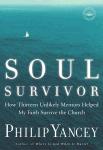 One source for that evangelical spirituality is Philip Yancey, author of
Soul Survivor: How Thirteen Unlikely Mentors Helped My Faith Survive the
Church (Doubleday, $12.95). Yancey is a regular columnist for
Christianity Today and has earned acclaim in the evangelical world for
his spiritual writing, but is little known in the Catholic realm. That’s
too bad, for Catholics -- especially in this season of ecclesial discontent --
have much to learn from Yancey.
One source for that evangelical spirituality is Philip Yancey, author of
Soul Survivor: How Thirteen Unlikely Mentors Helped My Faith Survive the
Church (Doubleday, $12.95). Yancey is a regular columnist for
Christianity Today and has earned acclaim in the evangelical world for
his spiritual writing, but is little known in the Catholic realm. That’s
too bad, for Catholics -- especially in this season of ecclesial discontent --
have much to learn from Yancey.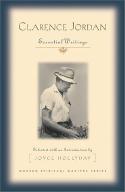 Another book from the evangelical world is Clarence Jordan: Essential
Writings (Orbis, $15). I didn’t know much about Jordan before reading
this collection, but I came away with the sense that here was one true saint of
the American South.
Another book from the evangelical world is Clarence Jordan: Essential
Writings (Orbis, $15). I didn’t know much about Jordan before reading
this collection, but I came away with the sense that here was one true saint of
the American South.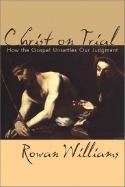 One such example is Christ on Trial: How the Gospel Unsettles Our
Judgment (Eerdmans Publishing) by Rowan Williams, the archbishop of
Canterbury.
One such example is Christ on Trial: How the Gospel Unsettles Our
Judgment (Eerdmans Publishing) by Rowan Williams, the archbishop of
Canterbury.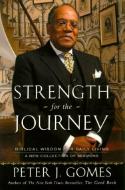 The Protestant focus on the scriptures is vividly evident in Strength
for the Journey: Biblical Wisdom for Daily Living (HarperSan Francisco,
$24.95), a collection of sermons by Peter J. Gomes, the famous
preacher/professor at Harvard.
The Protestant focus on the scriptures is vividly evident in Strength
for the Journey: Biblical Wisdom for Daily Living (HarperSan Francisco,
$24.95), a collection of sermons by Peter J. Gomes, the famous
preacher/professor at Harvard.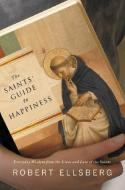 His latest offering on the subject is The Saints’ Guide to
Happiness (North Point Press, $23). Ellsberg emphasizes that the saints --
and in this he includes the officially canonized and those, like Day, who are
saints recognized by popular demand -- found the secret to happiness because
they kept their eyes on what is most important.
His latest offering on the subject is The Saints’ Guide to
Happiness (North Point Press, $23). Ellsberg emphasizes that the saints --
and in this he includes the officially canonized and those, like Day, who are
saints recognized by popular demand -- found the secret to happiness because
they kept their eyes on what is most important.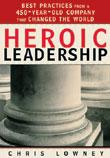 I usually loathe books such as Chris Lowney’s Heroic Leadership:
Best Practices From a 450-Year-Old Company That Changed the World (Loyola
Press, $24.95). I find these books on management, the ones with parables about
mice and their cheese or the story of how an ego-filled tyrant saved Behemoth
Inc. and turned it around in one quarter, to be insufferable. Their very
existence and how each one becomes a fad unto itself is an indication of why so
many organizations lack creative leadership.
I usually loathe books such as Chris Lowney’s Heroic Leadership:
Best Practices From a 450-Year-Old Company That Changed the World (Loyola
Press, $24.95). I find these books on management, the ones with parables about
mice and their cheese or the story of how an ego-filled tyrant saved Behemoth
Inc. and turned it around in one quarter, to be insufferable. Their very
existence and how each one becomes a fad unto itself is an indication of why so
many organizations lack creative leadership. “He comforts every part of you. He’s not afraid to touch
everything, including love and spirituality and how they mix and that you can
mix them,” she said before falling into a deep sleep.
“He comforts every part of you. He’s not afraid to touch
everything, including love and spirituality and how they mix and that you can
mix them,” she said before falling into a deep sleep.